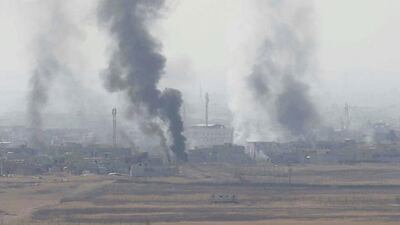BAGHDAD // For one policeman, the battle for Mosul is a chance to return home as part of victorious Iraqi forces who left the city in defeat two years ago.
Ahmed, whose last name is being withheld to protect his family from reprisals, fought against ISIL and was wounded by a suicide bomber in June 2014, when the extremists overran Mosul.
He lived in a camp for displaced Iraqis for more than half a year, then stayed with family, rejoined the police and is now deployed in the country’s north.
The battle for Mosul, the last ISIL-held city in the country, will bring Iraqi forces back to the scene of the 2014 debacle, giving them an opportunity for redemption after suffering one of their worst defeats.
Prime minister Haider Al Abadi announced the start of the long-awaited offensive on Monday.
For Ahmed, the operation is personal on several levels: he is a native of Mosul and still has relatives living in the city.
Retaking Mosul means a “return to my house and my family and my people, and this is the same situation for my friends – we all have relatives” there, Ahmed said by telephone.
It is a chance to “rescue my family and my relatives – I want to save them”, he said.
“We always feel that the state considers us traitors, and we want to prove to them that we are the opposite of that”, he said.
Ahmed said he had been working in the police for around two years when ISIL seized Mosul.
He was out early that day with a patrol that clashed with ISIL forces for several hours before running out of ammunition and falling back. Two members of that patrol died.
Later, a suicide bomber detonated an explosives-rigged tanker truck, killing a colonel and wounding Ahmed in the leg.
Reinforcements that were said to be coming from Baghdad did not materialise, and Ahmed and other security personnel were ordered to withdraw from the battle, he said.
“Our morale was finished, and we considered ourselves dead,” Ahmed said.
The fall of Mosul on June 10, 2014 was an unmitigated disaster in which top commanders and the prime minister played major roles.
Ample intelligence pointed to the impending attack, including from a captured ISIL commander who gave the day of the assault and the planned line of advance, according to a parliamentary inquiry into the city’s fall.
But that information was not acted upon and the attack went ahead as the militants had planned.
Top officers performed poorly, including a general who departed west Mosul with dozens of armoured vehicles the night before the city’s fall, “greatly harming the morale of the fighters”, the inquiry found.
For Ahmed, the fall of Mosul marked the beginning of a period of exile.
Eventually, a call was made for the province’s policemen to return to work, which he did some eight months after Mosul’s fall.
He underwent training, including by forces from the US-led coalition against ISIL, and is now deployed again as part of the Nineveh provincial police.
Iraqi forces, backed by air support, training and arms from the coalition, have made major strides against ISIL, regaining much of the territory that they overran in 2014 and 2015.
Ahmed’s unit is tasked with holding territory after it is retaken by other forces, but he said he wants to take part in the assault on Mosul.
“We will take our rights from the unjust, and retake our areas and protect them, with the help of God,” he said.
* Agence France-Presse

